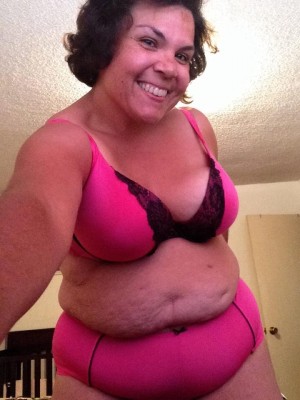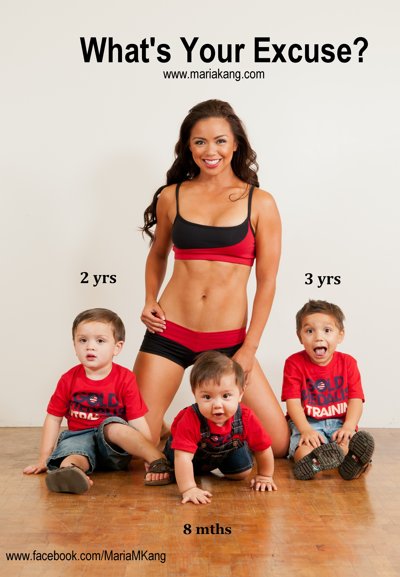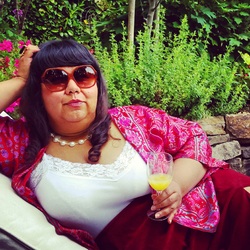|
You may have heard that "Fit Mom" Maria Kang attacked the recent Curvy Girl Lingerie campaign that took a stand against fat shaming online by showcasing selfies of "normal women" with "lumps, bumps, scars and stretch marks." When Facebook responded to her post by banning Kang temporarily for hate speech she told Yahoo! that she felt like she'd been "sent to the principal's office" and characterized the backlash as an over reaction to "this weight issue." From a November 25 Yahoo! Shine article: “We’ve become so sensitive to this weight issue that people who speak out against it are vilified... It’s so backwards to me.” In this statement, Kang attempts to position herself as a victim of those fighting to end size-based discrimination - characterizing legitimate concern and critique as an issue of sensitivity rather than one of social justice. Furthermore, Kang uses the language of victimization to position her views as a minority opinion when in fact there is compelling evidence that the bigotry she voiced is far more in line with cultural norms than the message that the Curvy Girl campaign was attempting to convey. Negative body image - and some of its attendant disorders - is a pervasive cultural concern. Proactive campaigns - like that of Curvy Girl Lingerie - that feature countervailing images and messages are integral to changing the discussion about the significance of body diversity and creating space for women to heal from the pervasive thincentric ideal presented by mass media. Though Kang's statement seems to dismiss the fight against fat discrimination, it is worth re-centering this discussion as one firmly based in civil rights and ending discrimination. As a fat activist, I am not engaged in a "weight issue," and in my opinion neither is Curvy Girl owner, Chrystal Bougon. I am part of a movement seeking to eradicate social and institutional fatphobia. I am part of a movement that advocates for the end of discrimination based on size. I am part of a movement that promotes the belief that women don't need to have an "excuse" if their bodies do not adhere to social expectations of fitness. One of the issues I feel none of the articles on this debacle have addressed is the role that gender, race and class play in Maria Kang's messaging.
When I look at Maria Kang I see a woman of color. When I read what she has to say I see ideas that are deeply impacted by the stifling pressures of a fatphobic, sexist and racist culture. Her "What's Your Excuse?" image truly asks the viewer to justify not only her body but her very existence. In this question lies a challenge, and moreso, an accusation. To me, Kang's question echos longstanding US narratives (like bootstrapping) that simplistically reduce things like employment and class ascendency to "hard work." Fitness ideals fall perfectly in line with the rigid individualism that characterizes so many of the impossible standards to which Americans are subject. I see her dogged defense of an ideology that does not actually benefit or humanize her (or really anyone) as the internalization of rhetoric that has long been used against people of color, women and working class people. I absolutely do not seek to absolve Maria Kang of autonomy or responsibility, but do wonder about her (and others') investment in this type of self-defeating ideology. The attention and overwhelmingly supportive response that the Curvy Girl campaign has received indicates the growing fortitude of a movement to end size discrimination. This work is more than a bunch of sensitive fat girls sending the Maria Kangs of the world to the principal's office. The simple truth is this: I'm not fighting for the right to lord my amazing jiggly thighs over others in a jpeg. I'm not fighting for the right to give people boners. I'm not fighting for the right to be a hot mom. I'm fighting for a life that feels like it belongs to me. I'm fighting for all the people who have been taught that hating themselves is normal. I'm fighting for every fat girl who perpetually has the word sorry half-formed on her lips. I'm fighting for liberation.
Monica
12/4/2013 12:13:39 am
Very well written response to a highly controvercial issue. More people could be so well spoken if they could set their emotions aside. Focusing on what is being said and where it came from makes it easier to understand the vocabulary someone choses. Fat or obese still means big in size, but it is how it is used in a sentence that creates the emotional turmoil such as the issue with crystal and Ms. Kang. The women in my community have certainly taken sides in this areaa of debate.
John Warren
12/4/2013 09:12:36 am
I just watched Access Hollywood, and I had not heard of the controversy until watching the program. I am overweight, and agree whole heartedly with what Maria Kang said. I'm overweight and therefore not healthy. I need to get my butt up and do something to make myself healthier. If I were to say that I'm happy with the way that I am, I would be lying...sure, over time I could convince myself that I am happy, but I would just be living a lie. Chrystal Bougon came off sounding very rude and even disrespectful. She is not the person that I want to be my spokesperson for my weight class.
"I'm fighting for a life that feels like it belongs to me. I'm fighting for all the people who have been taught that hating themselves is normal."
Kristen
12/4/2013 10:29:32 am
Thank you for a well written article. As an overweight woman I fight daily for weight control. I commend Maria for her diligence in maintaining her weight and figure. Not every woman is that lucky. Each of us has issues that we must overcome. I also want her to realize that not everyone views beauty the same way. Personally I think everyone has beauty.
Ryan Knight
12/4/2013 12:22:09 pm
Except, I can see it from Maria Kang's position, and I say that having a mother who spent the first part of my childhood at over three-hundred pounds until she finally lost the weight. My mother is African-American, so she got the whole gamut of weight-related issues that we are genetically predisposed to. She was pre-diabetic, she had high blood pressure, she couldn't breathe, and actually nearly tore her ACL after falling down a flight of stairs. The main culprit behind the injury? Her weight. Long story short, my mother was never healthy during the time she was overweight, she hated herself, and was constantly sick. This, from a woman who was once a Sergeant in the U.S. Army, and fit. What did she do? She started eating healthy, she quit listening to the jokers in our neighborhood who made fun of her weight, and she started working out. She has had the weight off for over fifteen plus years now, is 156 lbs - a healthy weight for a 5'9" woman, and feels good about herself and her body. She will be the first person, along with all of my other relatives - of both genders - that losing weight, and getting to a good and healthy weight for her height and frame was the best thing she ever did for herself, and the same for my family. She will also be the first person to tell you that you cannot be overweight and healthy, the two are mutually exclusive, and she will even tell you - along with every other formerly obese person I know of or is in the media - that before she did that she WAS dying, and could tell that she was dying. Now, is that the result of 'fat-shaming', or of cold, hard medical facts? I'd say the latter. Yes, I have witnessed firsthand how people treat the obese, it is ugly, and doesn't help the situation. I also don't agree with the media promoting women who are severely underweight. We all need to be happy with our bodies, regardless of gender, but we also need to keep our bodies healthy. FYI, I also used to be overweight (145 lbs on a 5'1" frame), and couldn't breathe due to the weight aggravating my asthma. I have inflammation issues due to a genetic disorder, and my pain was significantly worse when I was overweight. I did something about it, not because of the jerks teasing me, they simply opened my eyes to just how mean people CAN get towards the overweight, but I did it because I didn't want to die from either Type II diabetes, an asthma attack, or high blood pressure related illnesses. I like my body, I like being at a healthy weight, and I can see the point Kang is making. We need to like our bodies, but we also need to acknowledge the fact that obesity IS an epidemic in America, it IS becoming one of the leading causes of death, and it IS spreading. Now, we even have children who are DYING of obesity-related illnesses. Shaming doesn't work, education does, and also self-actualization and responsibility for our dietary choices. Women don't need to look like Kate Moss, but they do need to be healthy, and that is something I think we can all agree on.
Tammy
12/4/2013 09:45:01 pm
Other peoples health is none of your concern each and every person is different and some choose to be lazy while others have medical problems and in the end it's none of your business! Don't pretend to care about health while you're just being prejudice about somebody else's body because they do not look attractive to you, People have the right to be happy even if it's killing them you would not take the happiness away from a boy who has a 50% chance of surviving so why take away the happiness of a person who is overweight It would be really difficult to be happy when you know that your obesity will eventually kill you and cause your family so much pain. Why not just agree on loving yourself by becoming responsible of your health? Haters of those who are obese have insecurities themselves, and we should not make them the reason for weight-loss. Instead, we should endeavor to motivate ourselves to shed the pounds for health reasons so we can be absolutely fabulous and healthy. :)
Rebecca
12/5/2013 06:28:32 am
If this lady were standing there with her kids, holding up a PhD diploma and asking what's your excuse, many people would be up in arms. Some might say I have no time, or I have no money, or I'm not smart enough, or there are no opportunities for me, etc. Yet there are plenty of women out there who work hard to earn advanced degrees while balancing full time work and children.So would this mean that those women are superior to all other women? And should all women be required to follow the same path in order to be of value in society? There is no problem with pursuing your own goals but once those goals are pushed on everyone else it becomes a problem. Not everyone wants to or can earn an advanced degree, and that's their prerogative. The same thing applies to weight loss or anything else.
catherine
12/6/2013 02:16:06 pm
great analogy
Gina Jones
8/8/2014 10:48:08 pm
Thank-you, for this eye-opening article. No matter what your size, it is very disconcerting to me when I hear other women complain about their size and bodies, put themselves down, and point at a picture of someone in a magazine or online pic and declare, "I wanna be that!" "That," is an image of a person that you have no idea how they achieved their "results." As a former fitness competitor, I am reminded of the words of my trainer, who told me flat-out, "There is nothing healthy about this diet [I'm putting you on], it's all about how you will look." Yes, if you knew that many models vomit up their food, and swallow laxatives, (and these are young women still in their teen years), to achieve "thin thighs," would you do it?" Would you put your health in jeopordy?" We have to stop the judgment and self-hatred that we are allowing each woman to carry. It's not a health and weight issue, just like race is not a skin-color issue. It's an issue that all people are different and should not be shamed for it. Have you walked a mile in their shoes, whether fat, thin, or in-between." No? Okay, then you can't judge them. I will not say, "Yes, we should look like that fitness/cover model." I will just look incredulous as to why you hate your body so much and have such unrealistic expectations, when you have no idea what that person went through. Some people work hard and eat right. Some starve, binge, purge. Others overeat. Some eat and work out and still aren't "perfect." Some of us love food and hate diets. But, please, don't look at me as a "sister," in the fight to fatten my tummy and trim my thighs. My legs are strong and I'm proud of them. My tummy is rounded and always has been, even at 12 years old. After 3 kids, it's still there. My tummy will achieve flatness, or close to, on a starvation diet. Can't do it. I was meant to be curvy, rounded, and athletic. God bless me and you. 8/31/2014 07:16:16 pm
Thank you for a well written article. As an overweight woman I fight daily for weight control. I commend Maria for her diligence in maintaining her weight and figure. Not every woman is that lucky. Each of us has issues that we must overcome. I also want her to realize that not everyone views beauty the same way. Personally I think everyone has beauty.
Virgie Tovar
9/3/2014 02:03:35 am
Thanks for your comment, Sexologist. I think that women should pursue what makes them happy or what helps them feel safe in a culture that is so hostile to women/femininity. I, however, don't think my body size (or yours) is something to be overcome nor do I think exercising or existing below a certain weight are worthy of any particular note. And I don't really think of either as an accomplishment, honestly. I know that they are socially understood to be noteworthy but I see Kang's implementation of them largely as manifestations of personal desires to comply with social norms. Comments are closed.
|
Virgie Tovar
Virgie Tovar, MA is one of the nation's leading experts and lecturers on fat discrimination and body image. She is the founder of Babecamp (a 4 week online course focused on helping people break up with diet culture) and the editor of Hot & Heavy: Fierce Fat Girls on Life, Love and Fashion (Seal Press, 2012). She writes about the intersections of size, identity, sexuality and politics. See more updates on Facebook. Archives
April 2021
Categories
All
|





 RSS Feed
RSS Feed